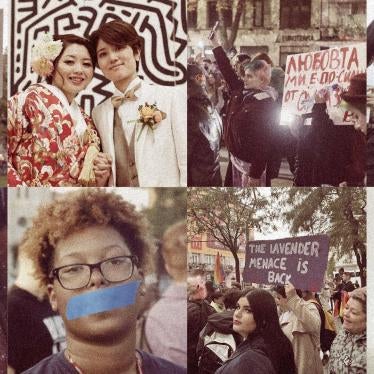On the eve of a five-year review of the United Nations women's conference, Human Rights Watch criticized many governments for tolerating widespread violence against women while spouting rhetoric in favor of women's rights.
Human Rights Watch made its call as governments gathered at the U.N. in New York to review improvements in women's status since the 1995 World Conference on Women in Beijing.
"Five years later, are we better off? Not on the issue of violence against women," said Regan Ralph, Executive Director of the Women's Rights division of Human Rights Watch. "We'd like to see governments leave New York with a plan to ensure that police, doctors, prosecutors and judges take violence against women seriously."
Since the 1995 women's conference, Human Rights Watch has conducted research in five countries — Pakistan, Peru, Russia, South Africa, and the United States—that documents how violence against women is fueled by the indifference of state officials and the failure to seriously investigate and prosecute cases of violence.
Official estimates from Russia indicate that 12,000 women die every year as a result of domestic violence. The Human Rights Commission of Pakistan concluded that upwards of 80 percent of women in that country are victims of domestic violence. In South Africa, there were 49,280 reported rapes in 1998; the nongovernmental Rape Crisis Center asserts that the actual number of rapes is much higher, given that many incidents go unreported. Peru's National Police received 28,000 reports of domestic abuse in 1998. In the United States, the Center for Disease Control reported that at least 1.8 million women are assaulted every year by the men in their lives. Also in the U.S., a 1999 government report indicated a serious problem of sexual abuse of women in state and federal prisons.
The greatest barrier to change is the still-pervasive notion that domestic violence is a man's prerogative and rape is the fault of the victim. This bias exists throughout the system, among police, prosecutors, doctors and judges. "It's five years after Beijing, and women who report violence to the police are still likely to be blamed for the attack," said Ralph. "That's just not acceptable."
In Pakistan, for example, a police chief told Human Rights Watch that almost all women reporting rape had lied to cover up consensual sex. In Peru and South Africa, police overwhelmingly fail to respond to sexual assault as a crime unless the victim is a virgin, the offender is a stranger, or the violation entails the infliction of serious and visible injury. In the United States, incarcerated women who are raped by their guards face disbelief and retaliation when they try to report the assault. And in Russia, women reporting domestic violence are still told to take their problems home, where they belong.
Human Rights Watch hailed some changes in laws and official practices that help make the world safer for women. In 1997, the UN General Assembly endorsed specific criminal justice reforms to give equal protection to female victims of violence. Peru created one-stop centers for victims of domestic violence, where women can find police, medical examiners, and prosecutors, all under one roof. In early 2000, Pakistan's government promised to treat so-called honor killings as crimes. Since 1996, the South African police have trained some officers to respond effectively to cases of violence against women and established victim support programs. But such progress will be wasted without stronger commitments from governments to make needed changes.








